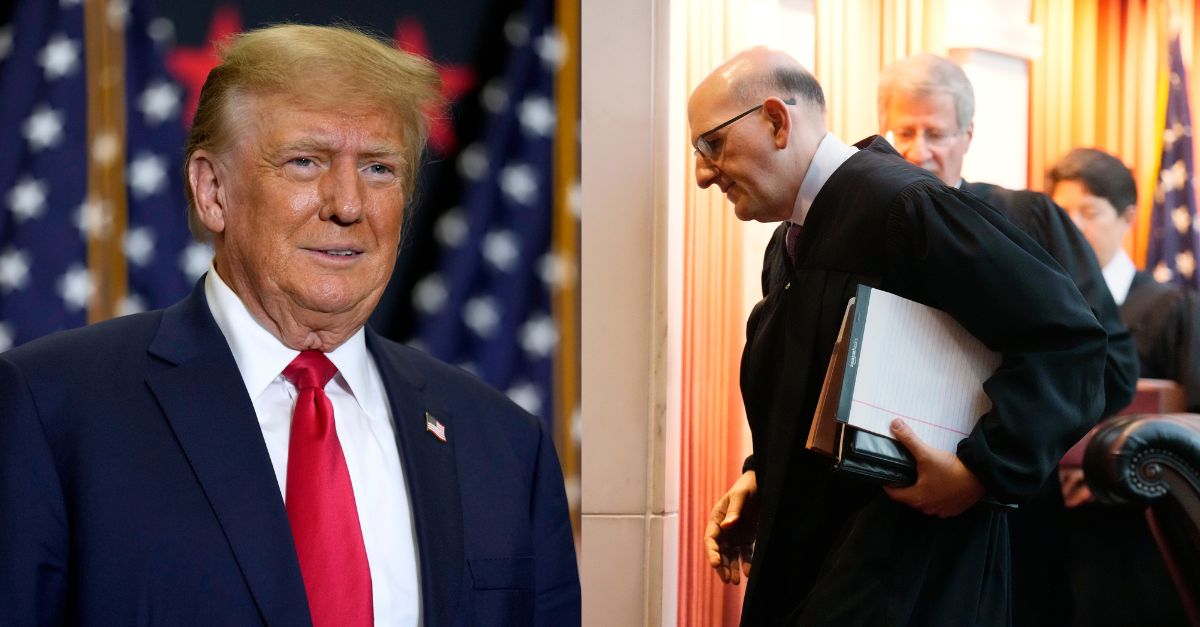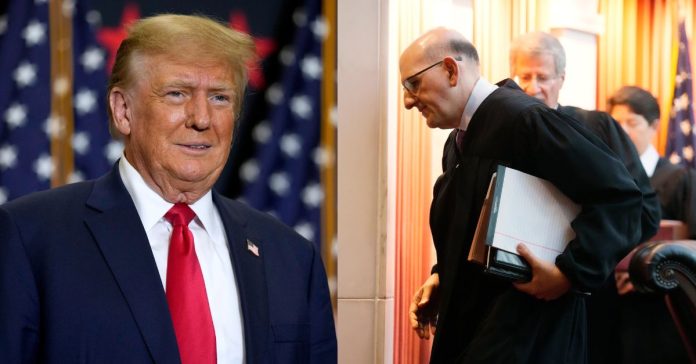
Left: Former President Donald Trump speaks during a commit to caucus rally, Dec. 19, 2023, in Waterloo, Iowa. (AP Photo/Charlie Neibergall) Right: Colorado Supreme Court Justice Carlos Samour, Jr., leads out Justices Richard L. Gabriel and Monica M. Marquez after a hearing on Wednesday, Dec. 6, 2023, in Denver. (AP Photo/David Zalubowski)
The Colorado Republican Party has appealed a ruling from that state’s supreme court that found former President Donald Trump ineligible for the presidency under the Constitution’s insurrectionist ban.
The 45-page appeal filed Wednesday increases the likelihood that the matter will go before the U.S. Supreme Court and slams the split decision by the Colorado Supreme Court earlier this month as an attack on the First Amendment and the disenfranchisement of millions of voters who may want to cast their vote for the former president.
In the Dec. 19 ruling, the state supreme court justices stayed any further action on Trump’s placement on the ballot until Jan. 4, the deadline for Colorado primary ballots to be printed. The stay also afforded an opportunity for appeals like this one from the Colorado Republican State Central Committee and any that might come from Trump directly. The former president is expected to appeal.
Section III of the Fourteenth Amendment disqualifies any person from holding office, or an “officer,” who violated their oath to support and defend the U.S. Constitution by engaging in insurrection. The Colorado Supreme Court found that Trump’s conduct was meant to subvert the certification of the 2020 election and met that bar. Evidence presented from his activities leading up to, on, and after the attack on the Capitol on Jan. 6, 2021, also supported the court’s 4-3 ruling.
The Colorado GOP argues that Section III is not a self-executing “sword” that can be used politically and further, that Trump is not technically considered an “officer” of the United States covered by the provision. This was a point of contention among the justices of the Colorado Supreme Court and remains one among constitutional and legal scholars of varying political stripes overall.
The petitioners argue that “it is undisputed that the presidency can be considered an ‘office,”” but they also argue that Section III does not disqualify all “officers” in a general sense.
“Instead, it only disqualifies ‘officers of the United States.’ This term of art is used in only three places in the Constitution: Section Three of the Fourteenth Amendment, The Commissions Clause, and The Appointments Clause, which provides that the President “shall nominate, and by and with the Advice and Consent of the Senate, shall appoint Ambassadors, other public Ministers and Consuls, Judges of the Supreme Court, and all other Officers of the United States. Accordingly, it is the President who appoints the officers of the United States and has authority to commission those officers,” the petition states. “He is not, himself, therefore, an officer of the United States. “Officer of the United States” is limited, each time it is used, to explicitly not include the Presidency.”
Never before has a court invoked Section III to remove a candidate from a ballot, the appeal argued.
“This unprecedented decision urgently merits this Court’s review to prevent “the potential chaos wrought by an imprudent, unconstitutional, and standardless system in which each state gets to adjudicate Section Three disqualification cases on an ad hoc basis,” lawyers for the Colorado Republican State Central Committee wrote this week.
Calling the ruling a “catastrophic” decision that would trigger other states to follow Colorado’s lead — some have already tried to remove Trump and have failed — the motion also claims the court’s ruling is “interference” and will “distort the 2024 presidential election” and “mire the courts henceforth in political controversies over nebulous accusations of insurrection” irreparably.
The initial petition in Colorado to remove Trump from the ballot was launched by a group of less than a half-dozen voters represented by a federal watchdog group, Citizens for Responsibility and Ethics in Washington. While there have any many challenges to Trump’s standing, this case was the only one that went the distance on its merits and standing.
In Michigan, for instance, that state’s supreme court rejected an attempt to boot Trump from the ballot, because it found that state law does not afford election officials the right to determine candidate eligibility
Despite this, calls to remove the former president from the ballot continue.
According to Louisiana Fox affiliate WVUE, a woman from that state filed a long shot lawsuit against Louisiana Secretary of State Kyle Ardoin on Dec. 22 demanding he remove Trump from the primary ballot given his role in the attack on the U.S. Capitol on Jan. 6, 2021.
Have a tip we should know? [email protected]

